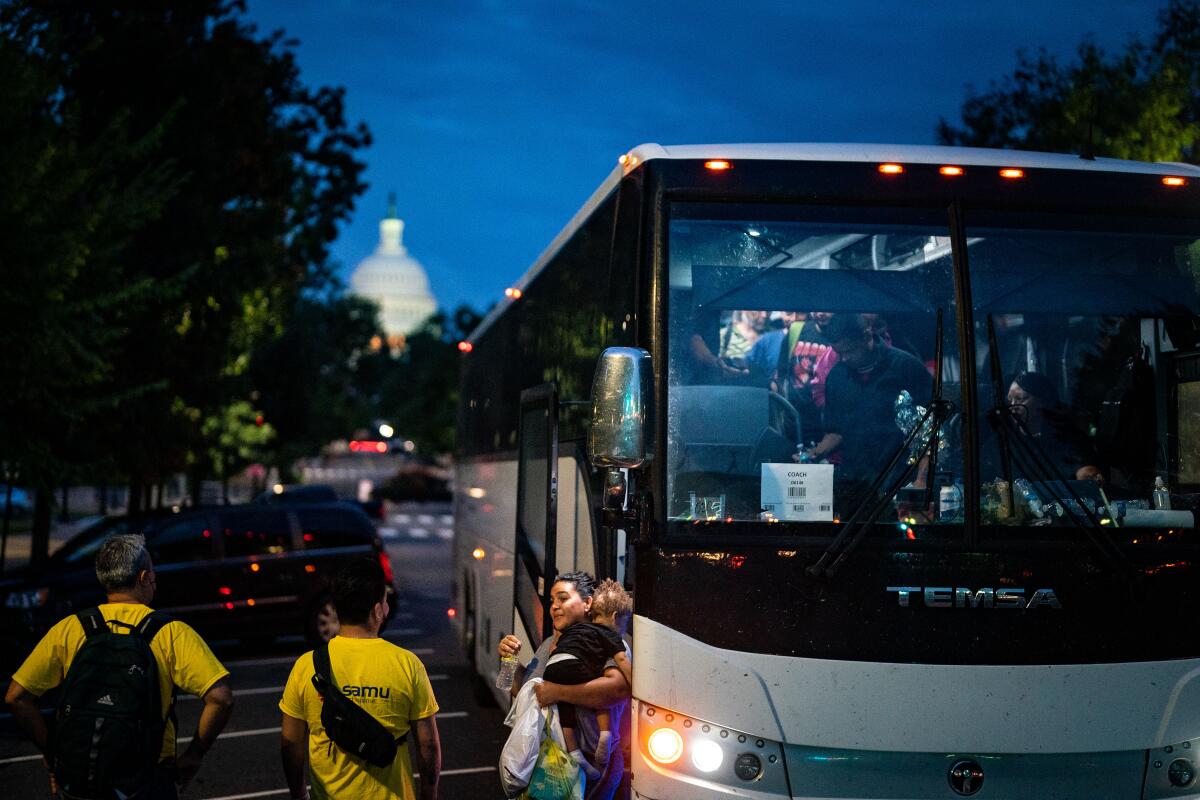Border chief says GOP governors’ migrant relocation campaign is stoking migration to U.S.

- Share via
A few days after Daniel got off a plane in Martha’s Vineyard, Mass., where he had been flown from San Antonio with other migrants by Florida Gov. Ron DeSantis, his phone buzzed.
It was a WhatsApp message from a friend back home: I heard you can get a lot of help out there, the friend said. Is it true?
Daniel, who asked The Times to identify him by only his first name to protect his immigration case, said word is getting back to other Venezuelans that officials in the U.S. will provide them free rides from the border to major cities including Washington, Chicago and New York.
If those like his friend who are already considering the journey to the U.S. think they can get picked up near the border and taken where they want to go, Daniel said, “any person would be encouraged.”
DeSantis and his fellow Republican governors in Texas and Arizona have used millions of taxpayer dollars to transport thousands of migrants, often without warning, from the southern border to liberal cities to the north, sparking criticism of political maneuvering and human rights abuses. The governors say they are trying to make a point about the need for tighter border restrictions.
At a news conference last month, DeSantis said he positioned people on the U.S.-Mexico border to gather “intelligence” to identify migrants who are seeking to settle in Florida and divert them “to sanctuary jurisdictions.”
“Every community in America should be sharing in the burdens,” he said a day after sending two planes to Martha’s Vineyard, an island off Cape Cod in Massachusetts. “It shouldn’t all fall on a handful of red states.”
But the practice may help convince others to make the trek to the U.S.-Mexico border, according to U.S. Customs and Border Protection Commissioner Chris Magnus. In an interview with The Times, Magnus said the politicians complaining about factors that attract migration to the U.S. are also creating them.
“It’s safe to say what’s going on is a pull factor, which is somewhat ironic given the criticism from some of these same governors involved in this about various pull factors that they claim already exist,” he said.
Magnus said social media is a strong influence, noting that it is enticing “when migrants hear that there are buses that will take them to locations where they are told they will receive benefits and jobs.” Human smugglers use the same information “to further manipulate and mislead migrants,” he said.
Renae Eze, press secretary for Texas Gov. Greg Abbott, told The Times the governor started the “bus mission” to support Texas border communities who she said were “pleading for help.”
“Instead of their hypocritical complaints about Texas providing much-needed relief to our overrun and overwhelmed border communities, the Biden Administration needs to step up and do their jobs to secure the border — something they continue failing to do,” Eze said in a statement.
Daniel, who is in his 20s, said a woman named Perla — whom the New York Times identified as Perla Huerta, a former combat medic and counterintelligence agent — recruited his group in San Antonio with a promise to fly them to Washington state or Oregon. He said he had no intention of going to Florida, and she didn’t ask. When he looked out the window and saw the plane was landing on an island, he said he felt deceived.
Now Daniel is among the plaintiff class members in a lawsuit filed last month by the advocacy group Alianza Americas and Lawyers for Civil Rights in Massachusetts federal court. The complaint alleges that migrants like him were defrauded in a politically motivated scheme.
Amy Fischer, advocacy director for the Americas at Amnesty International USA and a volunteer with the Migrant Solidarity Mutual Aid Network, said the vast majority of migrants arriving in Washington, D.C., don’t have friends or family in the U.S. and found the transportation helpful. She said that although the effort may be done “with the utmost ill intentions, the reality is that it’s a service.”
“People are not fleeing and trying to exercise their human right to seek safety because of a free bus ride,” she said. “That kind of political posturing is precisely why we are in this situation in which our politicians are playing political football on both sides of the aisle, rather than focusing on the needs of communities and the needs of people seeking safety on our shores.”
Migrants have been stopped along the border more than 2 million times this fiscal year, an all-time high driven in part by an increase in Venezuelans, Cubans and Nicaraguans fleeing authoritarian governments and economic hardship, according to U.S. Customs and Border Protection. That number doesn’t represent individual migrants because many try to cross the border multiple times.
More than 155,000 Venezuelans were encountered along the border in the first 11 months last fiscal year, which ended last week, up nearly fourfold from the same period the year before. Adam Isacson, director for defense oversight at the research and advocacy group Washington Office on Latin America, said the increase could be just the beginning. People might also be catching on to the fact that the Venezuelan government won’t accept deportees, so the vast majority of Venezuelans are allowed into the U.S. while their immigration cases move forward.
Nearly 7 million Venezuelans have fled since 2014, the second-largest global displacement after those fleeing Ukraine since the Russian invasion. Many Venezuelans have decided to make their way north by crossing the Darien Gap, a dangerous jungle between Colombia and Panama where at least 123 bodies have been recovered this year, according to Panama’s border service.
Word of mouth travels fast, Isacson said. For example, he said, after eight migrants drowned last month trying to cross the Rio Grande near Del Rio, Texas, more Venezuelans started crossing the border in El Paso, where the river is narrower.
“If the message from the U.S. government is ‘don’t come,’” he said, referencing Vice President Kamala Harris’ message to Guatemalans last year, “and then everybody is getting WhatsApps back saying, ‘Not only did I turn myself in, but the government paid for my bus fare,’ … it’s just one of many messages that are probably pretty enticing.”
Daniel said crossing the Darien Gap was riskier than he ever imagined. He wouldn’t do it again, and he wouldn’t recommend that others follow.
Castillo reported from Washington and Aleaziz from Healdsburg, Calif.
More to Read
Get the L.A. Times Politics newsletter
Deeply reported insights into legislation, politics and policy from Sacramento, Washington and beyond. In your inbox twice per week.
You may occasionally receive promotional content from the Los Angeles Times.












